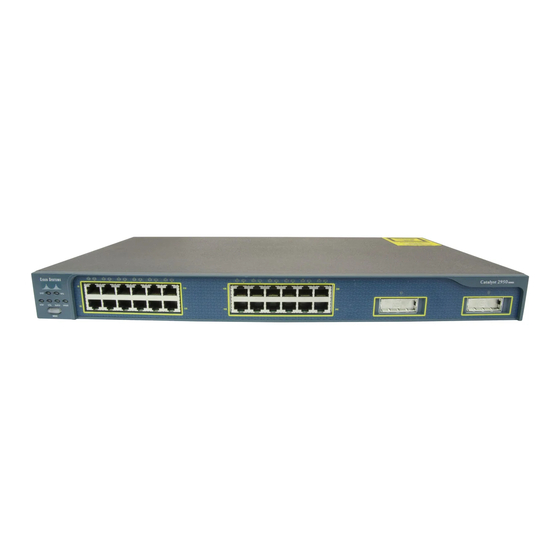Cisco Catalyst 2950G-24-DC Ficha de datos - Página 6
Navegue en línea o descargue pdf Ficha de datos para Interruptor Cisco Catalyst 2950G-24-DC. Cisco Catalyst 2950G-24-DC 19 páginas. Catalyst 2950 series switches with enhanced image software

Essentials, a Web-based management tool, offers automated inventory collection, software deployment, easy tracking of network changes, views
into device availability, and quick isolation of error conditions.
PRODUCT FEATURES AND BENEFITS
Feature
Benefit
Availability
IEEE 802.1D Spanning Tree Protocol support for redundant backbone connections and loop-free networks simplifies
Superior
network configuration and improves fault tolerance.
Redundancy
Support for Cisco Spanning Tree Protocol enhancements such as UplinkFast, BackboneFast, and PortFast technologies
for Fault Backup
helps to ensure quick fail-over recovery, enhancing overall network stability and availability.
IEEE 802.1w Rapid Spanning Tree Protocol (RSTP) provides rapid convergence of the spanning tree, independent of
spanning-tree timers.
Per VLAN Rapid Spanning Tree (PVRST+) allows rapid spanning-tree reconvergence on a per-VLAN spanning-tree
basis, without requiring the implementation of spanning-tree instances.
Cisco CrossStack UplinkFast technology extends UplinkFast to a stack to ensure quick fail-over recovery, enhancing
network stability and availability.
Support for Cisco's optional RPS 675, 675-watt redundant AC power system, which provides a backup power source
for one of six switches, for improved fault tolerance and network uptime.
Redundant stacking connections provide support for a redundant loopback connection for top and bottom switches in
an independent stack backplane cascaded configuration.
Provides unidirectional link detection (UDLD) and Aggressive aggressive UDLD for detecting and disabling
unidirectional links on fiber-optic interfaces caused by incorrect fiber-optic wiring or port faults.
Bandwidth aggregation up to 4 Gbps (two ports full duplex) through Gigabit EtherChannel technology and up to 16
Integrated
Gbps (eight ports full duplex) through Fast EtherChannel technology enhances fault tolerance and offers higher-speed
Cisco IOS
aggregated bandwidth between switches, to routers and individual servers. Port Aggregation Protocol (PAgP) is available
Software
to simplify configuration.
Features for
VLAN1 minimization allows VLAN1 to be disabled on any individual VLAN trunk link.
Bandwidth
Optimization
Per-port broadcast, multicast, and unicast storm control prevent faulty end stations from degrading overall systems
performance.
Per virtual LAN (VLAN) Spanning Tree Plus (PVST+ allows for Layer 2 load sharing on redundant links, to efficiently
use the extra capacity inherent in a redundant design.
IEEE 802.1s Multiple Spanning Tree Protocol (MSTP) allows a spanning-tree instance per VLAN, enabling Layer 2
load sharing on redundant links.
VLAN Trunking Protocol (VTP) pruning limits bandwidth consumption on VTP trunks by flooding broadcast traffic
only on trunk links required to reach the destination devices. Dynamic Trunking Protocol (DTP) enables dynamic trunk
configuration across all ports in the switch.
Internet Group Management Protocol version 3 (IGMPv3) snooping provides for fast client joins and leaves of multicast
streams, and limits bandwidth-intensive video traffic to only the requestors. Multicast VLAN Registration MVR, IGMP
filtering, and fast-join and immediate leave are available as enhancements. The number of IGMP groups can be limited
with IGMP throttling. IGMP Snooping time can be adjusted to optimize the performance of multicast data flows
MVR continuously sends multicast streams in a multicast VLAN while isolating the streams from subscriber VLANs
for bandwidth and security reasons.
Supports additional frame formats: Ethernet II (tagged and untagged) and 802.3 (Subnetwork Access Protocol [SNAP]
encapsulated tagged and untagged frames).
Important notices, privacy statements, and trademarks of Cisco Systems, Inc. can be found on cisco.com.
© 2004 Cisco Systems, Inc. All rights reserved.
Page 6 of 18
